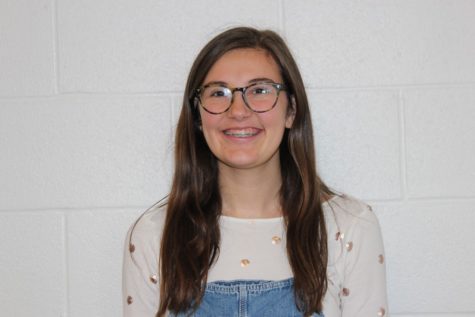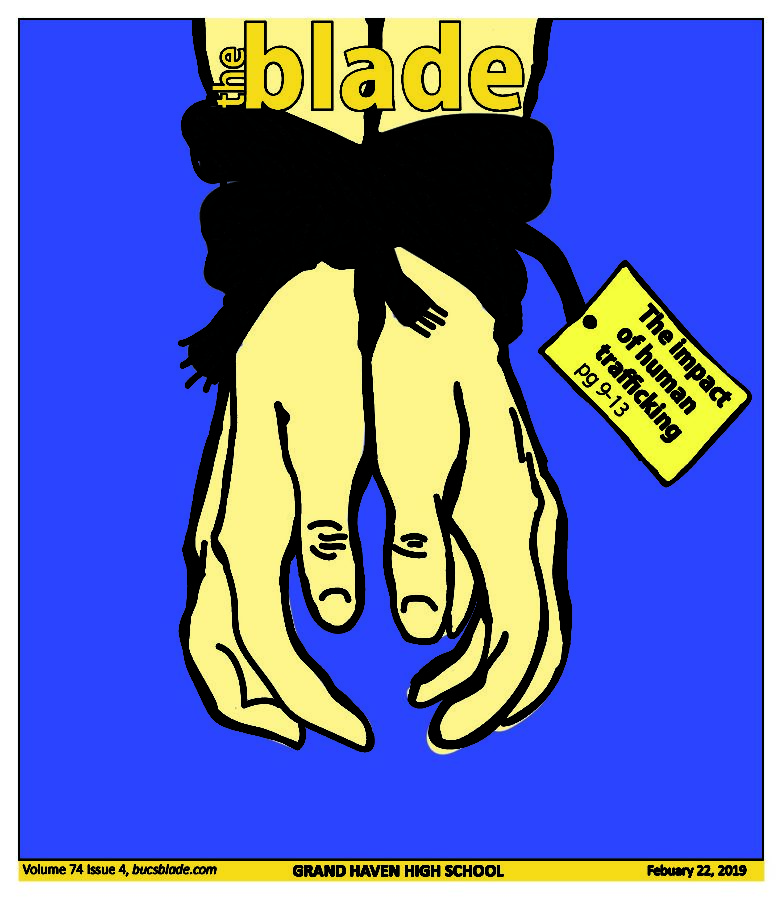Human trafficking not foreign to West Michigan.
Organizations trying to fight sex trade, help victims.
As the streets of downtown Grand Haven become illuminated by the dazzling lights of the carnival, a yo ung Leslie King steps onto one of the many yachts lining the dark waters of the Grand River. People travel miles to come and enjoy the Coast Guard Festival. King traveled just around an hour for a completely different reason.
Few noticed King as she stepped onto the boat, those who did were probably unaware that she was a victim, that she got onto that boat for the sole purpose of her body being sold.
King was being trafficked.
Human trafficking happens here in West Michigan everyday with many not even realising it. Many people in tough situations are taken advantage of and end up being exploited by people they believed they could trust.
This is one of the many problems with sex trafficking, it goes unnoticed.
Human trafficking is modern day slavery. It is the profiting or selling of another human being through force, fraud, or coercion.If the individual is under the age of 18 it is considered trafficking any time someone is profiting off the sale of their body.
King was only 15 years old the first time she was trafficked.
She grew up in a broken home in Grand Rapids with an abusive family, making her an easy target for traffickers.
After years of abuse and neglect, King attempted suicide but survived.
“Women like me from the streets if Johns don’t kill us, pimps don’t kill us or we don’t die of overdose, we kill ourselves,”King said in the short film “When Angels Fight”
King is not alone.
In 2018 over 5,000 cases were reported to the Human Trafficking Hotline. Of those, 176 took placein Michigan with many more cases going unreported, in part because they are hard for law enforcement to identify because people perceive victims of trafficking are prostituting themselves by their own free will.
King disputes this.
King said. “[We have to look at] what happened. What happened to her? What drove her to this?”
Someone takes advantage of their vulnerability. Traffickers target those with obvious insecurities and use them against them. They make them feel wanted and seen only to then force them into a life of prostitution.
When King was being trafficked, it felt like there was no hope for her. There wasn’t any place to go or anyone to believe her.
The growth of human trafficking has become a major problem, not only in Michigan but all over the country. With many people not admitting that it is a big issue. As human trafficking is becoming more widely recognized in West Michigan, nonprofits have formed to help educate the community on the issue and help those who have been trafficked.
In 2006, Jeff and Sue Martineau started the Hope Project. Since its founding it has helped survivors of human trafficking rebuild their lives.
“We offer services through the Hope Project to – literally our mission statement – support the healing of girls and women who survive trafficking and we do everything we can to prevent further cases through mentoring and education,”Mary Suarez, Lead Ambassador of the Hope Project said.
The project works with female survivors of sex trafficking to identify their needs. They help with legal services, sponsor counseling, provide basic necessities, safe places to stay and transportation as well as referring survivors to other resources that may be able to further the healing process.
“It just varies with each person that we have,” Sara Johnson, Director of Programming at the Hope Project said. “I have some clients that they’re able to come in and they’ll need more attention, you know, they just need more support than others, some might just need a resource or a referral.”
For survivors, one of their biggest battles is finding people who believe their story.
“They have never been validated, people have told them that their story is not true,” Johnson, said. “When they come see me and I tell them, ‘I believe you,’ it empowers them to be like, ‘Oh my gosh, this did happen to me, and then I can move forward in my healing because it has to be acknowledged.’”
The Hope Project pairs with two Christian therapists and sponsors therapy for survivors who don’t have access to it. It’s important for survivors to be able to tell their stories in a safe setting like therapy.
“[My role at the Hope Project is] just really being that caring ear, that lets them know that healing can be possible,” Johnson said. “Giving them a voice to be able to share and them realizing that they’re not alone and connecting them to different resources [is part of my job].”
They recently formed a new program where survivors meet in a group to work on projects, listen to speakers, but most importantly build connections with each other.
“They realize that they’re not alone,” Johnson said. “So many of them come to us thinking that they’re the only person that this has happened to and seeing others that have gone through it all, it just empowers them and it makes them feel like they’re not crazy.”
These survivors are facing similar struggles in everyday life as a result of being trafficked. Most do not have access to basic necessities.
The Hope Project created a pantry called Hope’s Closet where survivors can access personal hygiene products, clothing and other necessary items. “With our hygiene pantry that we have here, I had one woman come in, and she said how she was so happy to get all the stuff that we were able to give her because she would have been prostituting for all that stuff if we wouldn’t have been able to provide it for her,” Johnson said. “She said … ‘I would have to go out on the streets and trick for all of this.’ And so for that time, she didn’t have to do that.”
“Trafficking is not what it looks like on social media,” Suarez said. “There is no one … that is being kidnapped from the parking lot of Walmart. No one is stalking your children in Meijer. That’s not how trafficking is happening in our community.”
In many instances, human trafficking happens when a person is in a vulnerable scenario where it is easy for someone they know to take advantage of them.
“It’s not like you snatch a girl off a bus and put her in the human trafficking world,” Lt. Kristen Rogers said. “These are girls who have grown up in just terrible homes, they are runaways or have been sexually abused and usually they are teenagers.”
Seven years ago Rogers began working as a sergeant in a family service team for the Grand Rapids Police Department. One of this team’s jobs was to investigate juveniles who were involved with prostitution. Shortly after. Rogers began working for this team was also when training for human trafficking cases began as law enforcement realized the complexity of these cases.
“One of the problems with these cases is that often times, these women don’t see themselves as victims,” Rogers said. “A lot of these women were sexually abused as children, they grew up in horrific homes and so many of them say ‘Hey I have control over my body now, I get to say who has sex with me and when, so I am not a victim’ So these cases are extremely difficult. We spend hours and hours just trying to convince them that they are a victim.”
Since Rogers has dealt with these cases for many years she has seen their complexity as well as their terrible nature.
“We had two girls come in, one was 16 the other was 17,” Rogers said. “They had lived together at a facility for human trafficking and they ran away from that facility. Within 24 hours both girls had had over 20 partners.”
With the rising awareness of human trafficking, many police departments have increased training for the problem, but many still do not have the resources to take on these cases.
“We do the best we can, the hardest thing is keeping these women alive, sober and near the area long enough to even start a case,” Rogers said. “We do have a human trafficking task force with the FBI which has a lot more resources and manpower, but the police department itself cannot deal with all these cases.”
As for King, she had use her own determination to escape trafficking. She used that same perseverance to help other survivors, founding a nonprofit in 2005 called Sacred Beginnings that provides support and services for anyone in a similar situation.
King’s organization is successful because she is able to use her own experience with human trafficking to relate to these people and also raise awareness in her own community.
“It is easy to point a finger at someone than to admit society has failed, that’s why a lot of the time people don’t want to believe that it’s here,” King said. “But it’s always been here, you just haven’t seen it, people think it only happens in certain parts of town but it is everywhere. These women are somebody’s sisters, mothers, aunts, granddaughters, they are human beings.”

Senior Maddie Monroe is entering her third year on staff as Editor-in-Chief. She is excited to see what this year has to bring and to make the paper the...

Senior Morgan Womack is on her third year on staff, this time as co-editor-in-chief. She’s also involved in rowing, NHS, Student Senate and the Bucs...

Senior Sophia Jaeger is excited to be on the Bucs’ Blade staff for her last year of high school. Sophia is an overcommitted senior who is passionate...

